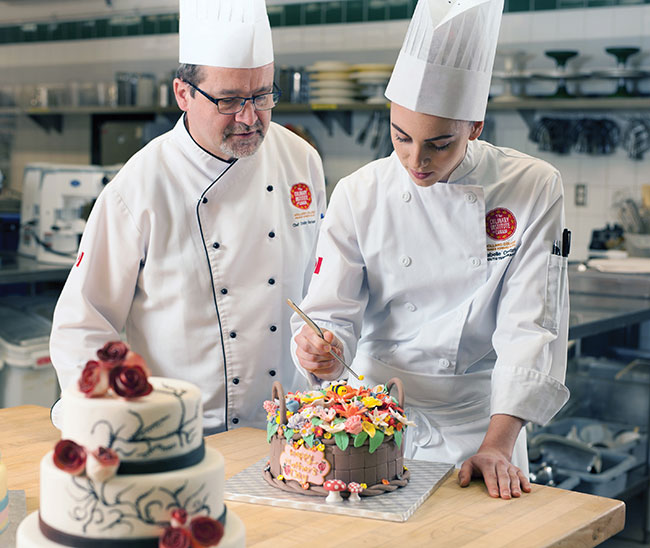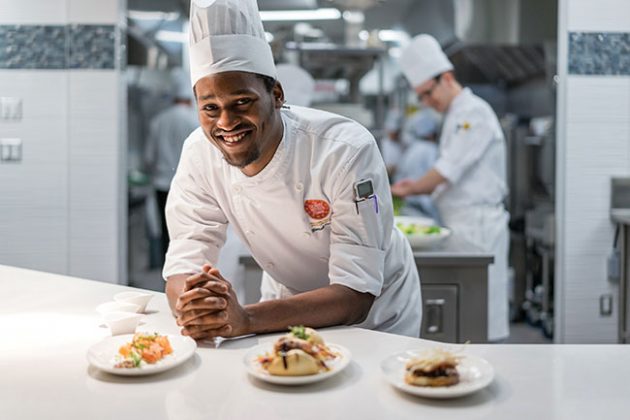
COVID19 and Culinary School
August 17, 2020
By Karen Barr
Traditional and online education for baking and pastry schools
 Student chefs at the Culinary Institute of Canada research, plan, and execute the menu for various real-world scenarios.
Student chefs at the Culinary Institute of Canada research, plan, and execute the menu for various real-world scenarios. In the last twenty years baking and pastry education has changed. Aspiring culinary students are already in the kitchen, at a young age, recreating recipes demonstrated by their favourite Food Network hosts or YouTube channel personalities.
The universal obsession with food has also made it part of the travel and tourism experience. More government money has been given to culinary school, in order the give the students the opportunity, space and equipment they need to succeed in the industry, and ultimately increase regional revenues.
Culinary schools teach the classics but have also expanded the repertoire to encompass a broader scope. While some school stick to the tried and true methodology of teaching, others craft courses to the student’s specific interest.
As schools were applauding the talent of their students, along came Covid-19. This has left both educators and administrator wondering just how to continue. Much discussion and planning has followed. Of course, everyone in the country is on edge about a second wave of the corona virus and the effects it may have, given there is not yet a proven vaccine.
NAIT, a polytechnical college, with four campuses— three in Edmonton and one in Grove, is a base for studies to over 40, 000 students. Each September, they offer their 2-year Baking and Pastry Arts Diploma. Plans for these students to start classes on time are already in the making.
“We usually have about 27 students enrolled each year,” says Alan Dumonceaux, chair of the Baking and Pastry Arts program. “This year we will cut the numbers in half to 13 or 14 students only. We will have the workstations set up, so students are working the required two meters apart, “he explains. “It won’t be a worry though, because we have a 4000 square foot space to work in. Both students and instructors will wear the required personal protective equipment.”
First year students study yeast fermentation and learn to create artisan loaves. The fundamentals of cookie and cakes making is also taught, as well as the production of first classical and then more modern pastries. “We start with the basics, like making bread by hand and later move on to laminated doughs, plated desserts, ice cream, sorbets and frozen products,” says Dumonceaux. Students also study courses in nutrition, safety, and sanitation.
By Year Two more advanced traditional baking, pastry and confectionary continues to be taught. This also incorporates specialty desserts from around the world. Then, it’s time to create the showstoppers, or mixed media showpieces and other edible arts. Dumonceaux is impressed by the talent NAIT continues to nurture. “By the end of the second-year students are working on advanced chocolate work and really stunning showpieces.”

That training is put into good use. In the third and fourth semesters, students work in the school’s much lauded, on-campus dining room called Ernest’s, which has 110 seats. Here students are responsible for making everything from the bread, to all the components of the plated desserts and even specialty items for chefs’ tables.
Across the country, on Canada’s tiniest province, baking and pastry instructor Richard Braunauer has happily been teaching at The Culinary Institute of Canada, at Holland College, in Charlottetown, Prince Edward Island, for 30 years. “The very first baking and pastry program had only one full-time student,” he remembers with a laugh.
In 2017, the school underwent a six-month, $7.5 million renovation, which included an additional $1.8 million for new and emerging technologies and equipment. The building was essentially taken down and then put back together, with a 3000-square-foot addition.
Today, each year, 30-35 students enroll and take part in the 1-year Pastry Arts certificate program, with a unique teaching method. “The first five weeks students learn the fundamentals, through theory and hands on classes. They develop a basic understanding, and feel for the ingredients and the work,” Braunauer explains.
During this time, students learn basic dough and batter preparation, advancing to classical French pastries and modern plated desserts. Classes start at 6 am. Every day at 10:30 am, students take a break from baking to study theory and observe a demonstration by Braunauer, who was classically trained in Europe.
Then, after the five-weeks are completed, students are part of six rotations— three in the morning and three in the afternoon. Here they are assigned to small teams, in which they will spend three to four weeks on specific assignments. Students must research, plan, and execute the menu for various real-world retail outlets and restaurants, on the campus grounds.
“The students have the ability to be more flexible in what they create, while working in conjunction with the instructors to come up ideas. It’s a more individualize way of teaching.”
For example, the Grab and Go outlet, students prepare all the loaf breads, muffins, and cookies. At the Marche Café, students provide all the quick bread, yeast breads and desserts. In the Fine Dining Room, lunch service includes four to five plated desserts, on the menu each week. And then there is dinner service. The school also hosts a numerous banquets and functions. Chocolates, truffles, and showpieces are always part of these celebrations.
“With every rotation there is a fixed practical mark,” explains Braunauer. He also notes that in the students works on individual assignments, which are self paced, such as planning and building a two or three-tiered wedding cake.
Of course, this year, the biggest hurdle to face is teaching, while managing Covid- 19. In a bid to keep the beautiful little island safe, Holland College has chosen to delay the start of the school year. On November 2, the first day of business classes will begin online with classes in business communication, computer essentials and WHIMIS. From January 3-17, 2021, students who do not live on Prince Edward island will be asked to arrive and undergo a period of self isolation. Then, on Jan 18, in person classes begin again, wrapping up in late June.
The pandemic aside, students are still signing up for classes in baking and pastry arts programs. Educational programs provide a valuable base of knowledge for those who are interested in working it the industry.
Print this page
Leave a Reply